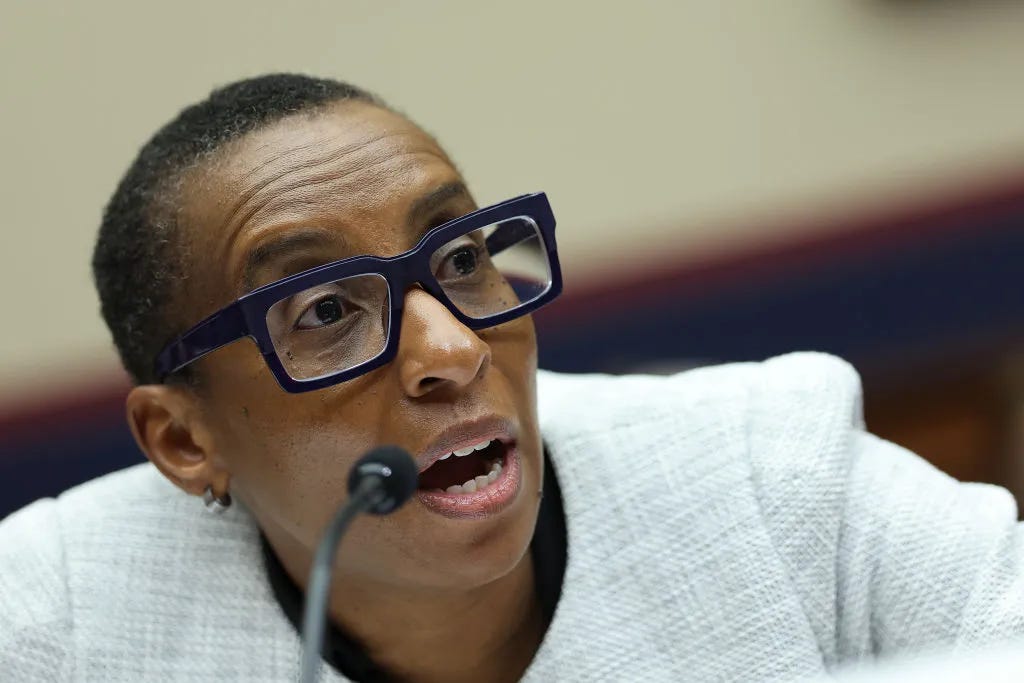
Harvard’s president, Claudine Gay, has been in the news for her reprehensible testimony to Congress declaring that chanting for the genocide of the Jews might or might not violate Harvard’s speech policies “depending on the context.” That testimony has been rightly condemned by all decent people.
Her atrocious testimony and the condemnation it deserved has, however, distracted from a separate academic scandal. She’s a plagiarist and perhaps a copyright infringer.
In her Ph.D. thesis (in political “science” naturally) Gay copied multiple times from other sources, often verbatim, without using quotation marks or attribution. In short, she presented the work and words of others as her own.
In writing, this is called plagiarism, and it is universally considered unethical. If a student is caught doing it, the ordinary outcome is an “F” and perhaps suspension or expulsion. If a reporter does it, they get fired. (If a politician does it, he gets to be president.)
When this plagiarism was initially brought to the attention of Harvard and Gay last fall, they stonewalled. Finally, Harvard mentioned it in their statement refusing to fire Gay for her squalid antisemitism. They said there were merely “a few instances of inadequate citation” in Gay’s work, but “no violation of Harvard’s standards for research misconduct.”
That determination is contrary to Harvard’s own written policy on the subject, where they state “Plagiarism is the misappropriation of another’s work, passing it off as your own without indicating the source.”
Harvard went on to state that Gay would request corrections to add citations and quotation marks to two of her articles. But if there was no plagiarism, then why is Gay making a correction?
There clearly was plagiarism, and most academics say so. Even the Boston Globe – a hard left newspaper – has called on Harvard to be more definitive about the matter. The Globe correctly notes that permitting plagiarism at Harvard is a very bad precedent.
One of the writers whom Gay plagiarized has written an op-ed in the Wall Street Journal, pointing out that Gay’s plagiarism is unfair because it steals both words and ideas that rightly belong to the writer. Plagiarism is not a victimless wrong.
Plagiarism is not illegal; it’s just cheating. What is indeed illegal, however, is its cousin, copyright infringement. Copyrights protect writings, artworks, computer codes and other expressions.
Congress did a good job in the current Copyright Act enacted back in 1976. Copyrights on a work exist automatically upon its creation. Registration is not required (though registration must later be made as a condition to filing a copyright infringement suit). The term of a copyright is very long – the life of the author plus 70 years.
Copying might not constitute copyright infringement if the copying is “fair use.” In deciding whether a copying is fair use, several factors are weighed, including:
*The purpose and character of the copying;
*The nature of the work;
*The amount that was copied; and
*The effect on the market for the copied work.
The first factor probably favors fair use in Gay’s case. The copying was arguably for academic purposes, though Gay certainly had a personal and pecuniary stake in those academic purposes.
The second factor may also favor Gay. The copied work was a scholarly work, not a work of entertainment like a popular movie or song.
The third factor is tricky. Gay copied only a small portion in relation to the copied work as a whole. But courts consider the importance of what was copied, not just the number of words. What Gay copied, naturally, was what was important.
The last fact is often said to be the most determinative. Did the copying adversely affect the market for the original? I’m guessing that more curious people have read the original that Gay copied in the last few months than read it in the preceding decades combined. In that sense, her copying affected the market for the original in a positive way.
But that’s only part of the story. As the original author noted in her Wall Street Journal piece, the acclaim that Gay obtained with her copying – a Ph.D. that ultimately led to the presidency of Harvard – is arguably the poisonous fruit of her unauthorized and unethical tree of copying.
Fair use is a mixed question of fact and law. There’s usually a role for a jury. The jury would not be the Harvard trustees.
The penalties for copyright infringement include the actual monetary injury suffered by the copyright owner, or “statutory damages” up to $150,000.
Here’s where it could get really hairy. There’s also such a thing as “contributory copyright infringement” where someone else knows of the infringement and contributes to it.
At this stage of the game, Harvard knows of Gay’s copying, and has done nothing to stop it. Merely adding quotation marks and adding attribution to the original author is not exculpatory. In fact, it can be seen as inculpatory, since it effectively admits the copying.
Finally, copyright law also entails ordinary vicarious liability. Just as a truck company is normally liable for the accidents caused by its drivers in the course of their employment, so too is an employer liable for the copyright infringements of its employees committed in the scope of their employment.
On balance, Gay’s plagiarism probably is not copyright infringement. But it’s not a clear case – a jury could easily decide otherwise. In any event, what sort of prestige university has a president who is clearly an antisemite and a plagiarist and arguably a copyright infringer?
Glenn Beaton was an intellectual property lawyer practicing copyright, trademark and patent law in the federal courts, including the Supreme Court. The views herein are his alone, and should not be attributed to any other person or organization.

I wrote an a 103-page master thesis completed in 2021 and I am not a young age. I think my opinion should carry some weight. The use of quoted passages by itself constitutes fair use, even long passages. The problems is that Claudine Gay did not credit the sources of passages she quoted or even note that these were quotes from.
Exactly how the passages are identified as quotes and exactly how the sources are credited can vary. If someone does not use quotation marks or make the passage into a blockquote, that is only a violation of editorial standards but probably not a violation of the legal standards pertaining the what plagairism or copright infringement is.
What she did is plagairism for sure and I am sure meets the legal standard for what constitutes copyright infringement in that a thesis or disseration, unlike an ordinary class or seminar paper, is a published work. Whether the owner of the work wants to take action is another question, but whether or not there is copyright infringement is something that can be considered by the institution along with the issue plagairism.
Plagairism is issue enough and I doubt anyone will dive that far into the cobbly worlds of copyright infringment. I just have to think, how can someone thusly exposed continue on as a president of a university – any university? Maybe in delaying her departure from she and some of the people around her thought they had a window of time during which they could cook up some diplomatic solution. Sorry, but that window opened and closed real fast, if there ever was a window in the first place. How can they ease her into some other position while claiming that she did no wrong but that she is moving for the sake of the good of Harvard community and the American body politic? The answer is, they can’t. Not in a way that has any credibility.
Thanks for your comment.
Plagiarism and copyright infringement principles overlap quite a lot in written material, but they are not co-extensive. For example, using quotation marks and/or giving attribution to the original author avoids plagiarism, but does not avoid copyright infringement. And “fair use” is purely a copyright matter, not a plagiarism matter.
As I’m sure you know, plagiarism is not illegal, while copyright infringement is.
The most important point, however, is that this alone should cost her the presidency of Harvard, whether it’s characterized as plagiarism or copyright infringement or both. Add to that the antisemitism, and it’s bizzare that she’d still there.
I am quite sure that quoting even a long passage in a thesis, dissertation, article or a non-fiction book would constitute fair use. How long? I’m not sure but I would guess as long a 600 words would never be a problem. One of the reason I wrote on and on in thesis to about 50 percent longer than the requirment is because I did have a good number of long quotes and didn’t want create the insuation that I was padding my paper. I made them as long as I tbough necessary to make my point.
It would be interesting to learn what part, if any, the plagiarized material played in her dissertation defense.